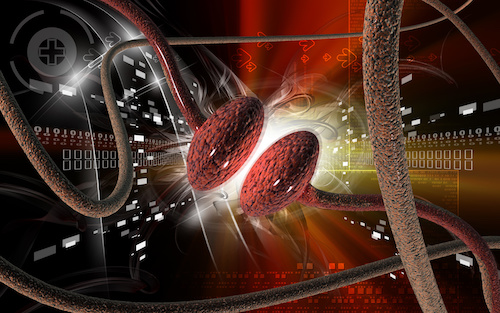
A new study in mice led by UCLA biologists strongly suggests that serotonin and drugs that target serotonin, such as anti-depressants, can have a major effect on the gut’s microbiota — the 100 trillion or so bacteria and other microbes that live in the human body’s intestines. An estimated 90% of the body’s serotonin is produced in the gut, where it influences gut immunity.
The team, led by senior author Elaine Hsiao and lead author Thomas Fung, a postdoctoral fellow, identified a specific gut bacterium that can detect and transport serotonin into bacterial cells. When mice were given the antidepressant fluoxetine, or Prozac, the biologists found this reduced the transport of serotonin into their cells. This bacterium, about which little is known, is called Turicibacter sanguinis. The study is published in the journal Nature Microbiology.
“Our previous work showed that particular gut bacteria help the gut produce serotonin. In this study, we were interested in finding out why they might do so,” said Hsiao, UCLA assistant professor of integrative biology and physiology, and of microbiology, immunology and molecular genetics in the UCLA College; and of digestive diseases in the David Geffen School of Medicine at UCLA.
Hsiao and her research group reported in the journal Cell in 2015 that in mice, a specific mixture of bacteria, consisting mainly of Turicibacter sanguinis and Clostridia, produces molecules that signal to gut cells to increase the production of serotonin. When Hsiao’s team raised mice without the bacteria, more than 50% of their gut serotonin was missing. The researchers then added the bacteria mixture of mainly Turicibacter and Clostridia, and their serotonin increased to a normal level.
That study got the team wondering why bacteria signal to our gut cells to make serotonin. Do microbes use serotonin, and if so, for what?
In this new study, the researchers added serotonin to the drinking water of some mice and raised others with a mutation (created by altering a specific serotonin transporter gene) that increased the levels of serotonin in their guts. After studying the microbiota of the mice, the researchers discovered that the bacteria Turicibacter and Clostridia increased significantly when there was more serotonin in the gut.
If these bacteria increase in the presence of serotonin, perhaps they have some cellular machinery to detect serotonin, the researchers speculated. Together with study co-author Lucy Forrest and her team at the National Institutes of Health’s National Institute of Neurological Disorders and Stroke, the researchers found a protein in multiple species of Turicibacter that has some structural similarity to a protein that transports serotonin in mammals. When they grew Turicibacter sanguinis in the lab, they found that the bacterium imports serotonin into the cell.
In another experiment, the researchers added the antidepressant fluoxetine, which normally blocks the mammalian serotonin transporter, to a tube containing Turicibacter sanguinis. They found the bacterium transported significantly less serotonin.
The team found that exposing Turicibacter sanguinis to serotonin or fluoxetine influenced how well the bacterium could thrive in the gastrointestinal tract. In the presence of serotonin, the bacterium grew to high levels in mice, but when exposed to fluoxetine, the bacterium grew to only low levels in mice.
“Previous studies from our lab and others showed that specific bacteria promote serotonin levels in the gut,” Fung said. “Our new study tells us that certain gut bacteria can respond to serotonin and drugs that influence serotonin, like anti-depressants. This is a unique form of communication between bacteria and our own cells through molecules traditionally recognized as neurotransmitters.”
The team’s research on Turicibacter aligns with a growing number of studies reporting that anti-depressants can alter the gut microbiota. “For the future,” Hsiao said, “we want to learn whether microbial interactions with antidepressants have consequences for health and disease.” Hsiao wrote a blog post for the journal about the new research.
Conclusion/ Host association with T. sanguinis alters intestinal expression of multiple gene pathways, including those important for lipid and steroid metabolism, with corresponding reductions in host systemic triglyceride levels and inguinal adipocyte size. Together, these findings support the notion that select bacteria indigenous to the gut microbiota signal bi-directionally with the host serotonergic system to promote their fitness in the intestine.




